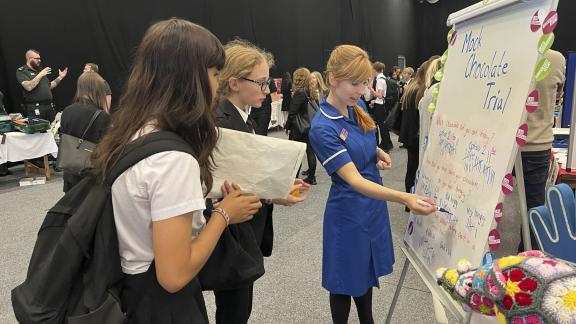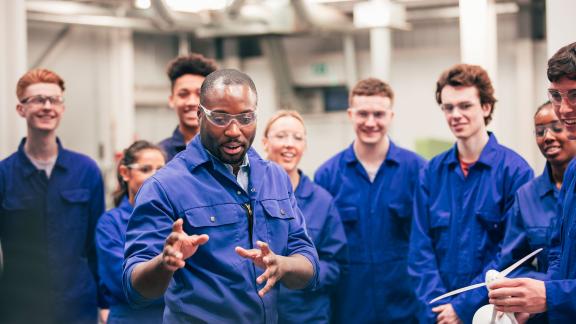We Care into the Future

Introduced for the first time in July 2019, the We Care into the Future event aims to inspire young people, by challenging their perceptions around the career opportunities available across health and care.
By invitation only, year 8 students are invited from across all secondary schools in the area to experience a simulated patient journey before exploring over 350 career pathways, facilitated over 50 interactive stalls. Since its introduction, four events have been held in Doncaster and more recently two events in Bassetlaw. The 2024 events welcomed over 2,000 year 8 students who explored the ladder of opportunities accessible to them within health and care.
Key benefits and outcomes
- Raising the aspirations of our young people.
- Showcasing the many career pathways that are on offer in health and care.
- Inspiring our future workforce, to ensure the continued delivery of safe and effective patient care.
- Achieving anchor institution ambitions, ‘better jobs leading to better health outcomes’ for our communities where barriers to life and learning often inhibit many from achieving their full potential.
- Positively impacting on the morale of our existing workforce, by enabling an opportunity to share their own career journeys.
What the organisation faced
Following the introduction of the UK’s first ‘Foundation School in Health’, a formal partnership between Doncaster and Bassetlaw Teaching Hospitals NHS Foundation Trust (DBTH NHSFT) and local secondary school, Hall Cross Academy, a 3-year plan was developed with the aim of providing meaningful encounters between employers and all schools.
A careers event was identified as an activity that aimed to be inclusive to all year groups regardless of current aspiration, or more importantly for those who had not yet considered their future career.
In collaboration with the heads of all secondary schools, it was decided that the event would be made accessible to all year 8 students across the area. The influencing factors for this decision included the following:
Careers events existed for years 9, 10, 11, 12 and 13 whereby young people would be guaranteed an opportunity to explore careers in health and care yet there was no offer available for year 8 students.
It was considered that year 9 students were required to select their GCSE options, at which point many were unaware of the vast array of career opportunities in health and care, therefore providing insights into the opportunities available prior to selecting their GCSEs was considered essential.
Six events have now been held across Doncaster and Bassetlaw, all of which aimed to challenge the typical careers event model by providing unique insights into a patient journey and opportunities to get hands-on and have a go at hundreds of activities.
What the organisation did
The event aimed to highlight the range of career opportunities across health and care, so it was critical to ensure key employers and education partners were invited to participate in the strategic planning of the event.
To ensure learners had an insight into a wide variety of careers, the simulated patient journey was created. Starting with the patient being attended to by our paramedic colleagues, the studnts followed his journey into the emergency department. Once stabilised, the patient was transferred to theatre and then cared for on the ward post-operatively, where our allied health professional colleagues supported the patient in the first stage of their recovery journey. The final stage enabled the students to encounter care in the community.
The intention was for students to explore the wealth of career pathways essential in ensuring safe effective care throughout the patient’s journey including clinical and non-clinical roles. Employer partners from small and large organisations were invited to identify areas where workforce challenges are present now or may arise in the future. These particular pathways were highlighted across the many interactive stands. Education providers also facilitated a range of interactive stands showcasing the traditional and vocational education pathways matched to the encounters experienced. These included apprenticeships, T Levels, pre-registration pathways, and direct entry routes.
Results and benefits
Pre and post-evaluation data was collected from participants to demonstrate impact. Evaluations were also captured on the day from attendees, stallholders, and teachers. This feedback includes asking whether attendees would consider a career in health and care, with a recent even finding that eighteen percent would, and a further forty two percent might consider a career in the sector.
A full evaluation report was collated after each event to demonstrate the impact. This report is shared with strategic partners and beyond on publication.
The findings have served to inspire others to recreate the event across not only the region but also employers across the UK, who are keen to explore further.
The strategic planning group is now exploring a range of methodology to allow us to collate more longitudinal data as our first attendees prepare to leave post-16 education. The long-term impact is yet to be yielded however, short-term evaluations demonstrate that perceptions were changed, and aspirations raised for many of those who attended.
Overcoming obstacles
Now serving two ICBs, DBTH and partners have committed to delivering an annual event for each ICB, Doncaster and Bassetlaw. Due to the scale of the events, the administrative burden has resulted in the need to ensure a dedicated coordinator is available.
In addition, funding is key to the sustainability of this event. To ensure every child can attend, the organisers not only ensure the venue is funded, but also transport is accessible to all schools free of charge. Funding is reliant on the financial contribution from several sources from across place and regionally.
Take away tips
Partnership is key to success.
Senior leadership support and engagement is also key in ensuring a sustainable model.
Advanced planning is necessary to ensure schools can attend and the logistical challenge that scheduling attendance presents can take place.
Resources – consideration for a dedicated coordinator, funding availability, and commitment from key participatory stakeholders is essential prior to any planning.
Contact details
If you would like to find out more about this case study, please contact Kelly Turkhud, Head of Education (Widening Participation): kelly.turkhud@nhs.net or dbth.vocationalsupport@nhs.net



